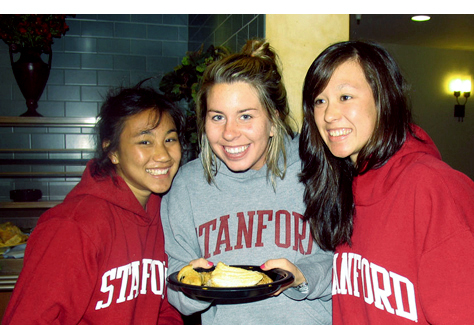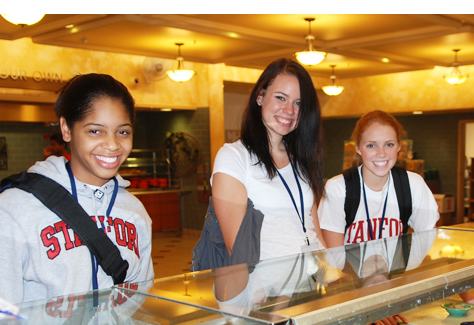Residence Hall Dining
At Stanford, students find that many of their most memorable conversations and social activities take place at their dining hall. Eating with housemates is an essential part of Stanford's Residential Education program; eating together helps to build a sense of community among residents, faculty, and guests within a house. Many residential academic programs, such as faculty night and dinner lectures, are focused around meal time.
All students assigned to undergraduate Student Housing locations on campus, with the exception of those in apartments, are required to purchase a meal plan. Depending on your assignment, this will take the form of a Stanford Dining meal plan, a house-managed board plan or a Dining Society meal plan. Graduate students living in apartment residences are not required to carry a meal plan but may purchase one.
Residence Halls with Dining Facilities
Residential & Dining Enterprises (R&DE) offers students a range of all-you-care-to-eat meal plans through its Stanford Dining division. Stanford Dining is one of the most celebrated programs in the country; it is the first certified Green Business university food-service program in the nation and has earned both regional and national recognition for outstanding chefs, menus, and sustainability programs.
Under Stanford Dining plans, students may choose from a variety of fresh, nutritious menu options that include organic produce, hormone-free meats, vegan, and vegetarian foods. Whenever possible, food is prepared using healthy cooking methods such as steaming and grilling. Stanford Dining plans give students all-you-care-to-eat access in any of the dining halls on campus.
Stanford Dining Meal Plans
Meal plans provide nutritious, high quality meals, maximum flexibility of eating locations across campus, and are designed for every appetite. Besides the required meal plans enjoyed by students living in the residence halls, there is a special apartment meal plan for graduate students and undergraduate students living in apartment style housing. Please visit Stanford Dining’s page for details on dining plan options.
Special Dietary Needs & Religious Food Practices
Stanford Dining values the cultural and religious diversity that is intrinsic to the Stanford community. If you live in a residence with a required meal plan, you may request an exemption if there are concerns about meeting religious dietary requirements.
Exemption Request
Depending on where you live, exemption requests must be submitted to and approved by Stanford Dining, a Dining Society manager, or the house staff in Row houses. There may be a fee associated with such an exemption. Please verify your eligibility for an exemption prior to applying for a residence. Questions regarding this policy should be addressed to the Assistant Director for Student Management at (650) 723-0778 or Stanford Dining at (650) 723-4751.
Written Documentation
Each exemption request must be accompanied by acceptable written documentation from an independent (non-relative) clergy. Religious exemption applications are processed by the Stanford Office of Religious Life: http://religiouslife.stanford.edu.
Kosher Meals
In partnership with Hillel at Stanford and Residential Education, Stanford Dining is offering three kosher dinners a week at Florence Moore Dining Hall. Students can use their meal plan or pay per meal for dinners on Monday, Tuesday and Wednesday evenings from 5:15 – 6:15 p.m. For more information see Florence Moore Dining. The meals are cooked in Hillel’s supervised kosher kitchen, brought to the dining hall, and served in a special serving area.
On Friday nights, students come together at Hillel's home, the Ziff Center for Jewish Life, for free Kosher catered meals. Information on any specific Friday night is available at http://hillel.stanford.edu. Most weeks, Saturday lunch is available as well. In addition, Chabad at Stanford serves meals on Shabbat. More information is available at http://chabadstanford.org.
Halal Meat
In all the dining halls, Stanford Dining guarantees the availability of:
- Halal meat upon request at the Grill during lunch and dinner.
- One daily halal meat entrée for dinner per dining hall, clearly labeled with the consistent “Halal Dish” sign and logo.
- Halal Favorites- One day a week at each dining hall, a specialty halal dish will be served based on student popular demand.
- Stanford Dining has invested in a set of pots, pans, grill accessories, knives, and cast-iron grill extensions at each dining hall designated for exclusive use in preparing halal meats to prevent cross-contamination with non-halal meats and ensure that halal meat preparation standards are met.
- Disposable dishware and cutlery are always available upon request.
For more information, see Halal Options.
Peanut/ Sensitive Ricker Dining
In response to a clear need for peanut allergy awareness in university dining services nationwide, Stanford Dining has made Ricker Dining the first on-campus dining facility in the country to designate itself a peanut-sensitive environment. Peanuts are quickly becoming one of the world's foremost food allergens, and 3 million Americans currently suffer from all levels of nut and peanut allergies. Here at Stanford, some students have such severe peanut allergies that they had to avoid eating in our dining halls for fear of contact with peanut material residue on countertops, breathing in vapors from peanut shell fumes, or ingesting as little as one-five thousandth of a teaspoon of food containing peanuts. With Ricker Dining becoming a peanut-sensitive environment, Stanford Dining is paving the way for other institutions to follow in our footsteps, and we are proud to be able to meet such a pressing health need of our students.
For more information on our Peanut Sensitive program, please call Stanford Dining's central office at (650) 725-1508.
Campus Cafes
Stanford Hospitality and Auxiliaries, a division of Residential & Dining Enterprises, operates unique cafes and restaurants across campus. See Cafes and Retail Locations for a list.
Dining Societies
Undergraduate students living in the Suites are required to join one of four Dining Societies. (There are no exceptions to this requirement.)
The Dining Societies are student-run organizations that offer a variety of eating plans and sponsor social activities as well. Students are billed quarterly for their dining society meal plan on their university bill.
For more information contact the Dining Societies (near the Governor's Corner Suites), (650) 497-7731.
Self-Ops and Fraternities/Sororities
Self-ops and fraternities/sororities are undergraduate houses in which student residents and non-resident eating associates hire a house cook and manage the operation of the house's meal service.
Self-ops include: 680 Lomita, 717 Dolores, BOB, Durand, Grove, Haus Mitteleuropa Jerry, La Casa Italiana, La Maison Francaise, MARS, Muwekma-Tah-Ruk, Narnia, Phi Sig, Roth, Slavianskii Dom, Storey, Xanadu, and ZAP.
Information about eating associate plans may be obtained from a house’s kitchen manager.
Co-ops
Co-ops are undergraduate student residences in which residents and nonresident eating associates, manage the house meal service and prepare all meals themselves. Eating associates at co-ops arerequired to work two to five hours per week planning, preparing, and serving meals. Because students prepare all meals, co-op board plans cost less than other meal plans at Stanford.
The seven co-ops are: 576 Alvarado, Columbae, Hammarskjöld, Enchanted Broccoli Forest, Kairos, Synergy, and Terra.
Students interested in becoming an eating associate at a co-op should contact the house’s kitchen manager.
Cooking
Students living in apartments have private kitchens. Generally, students in apartments cook for themselves or with their roommates. Residents may also:
- Take advantage of a specially-priced meal plan through Stanford Dining
- Become eating associates in a student-managed house or organization.
Though meal plans are required in all other residences, students in most houses also have access to a small, communal kitchen. In many student-managed residences, the house kitchen is open to residents at all times.


